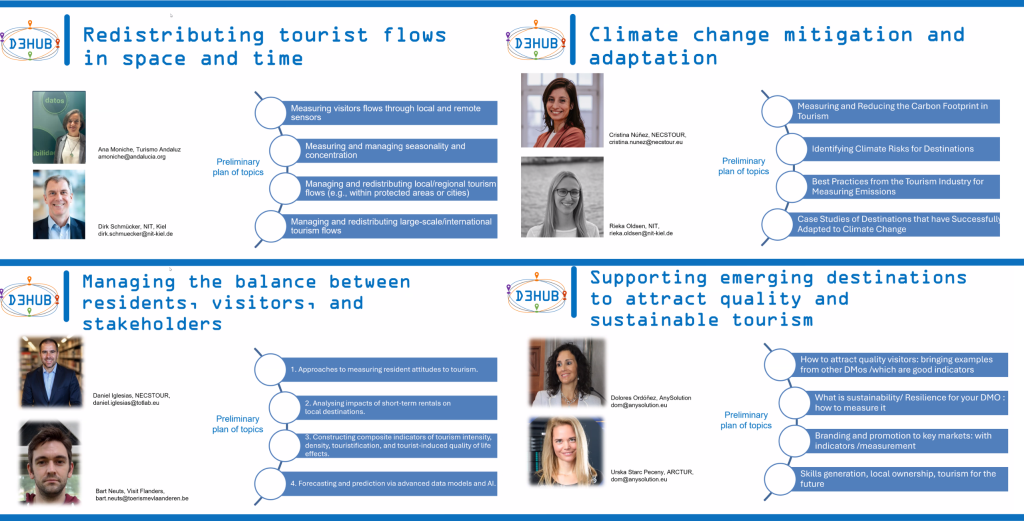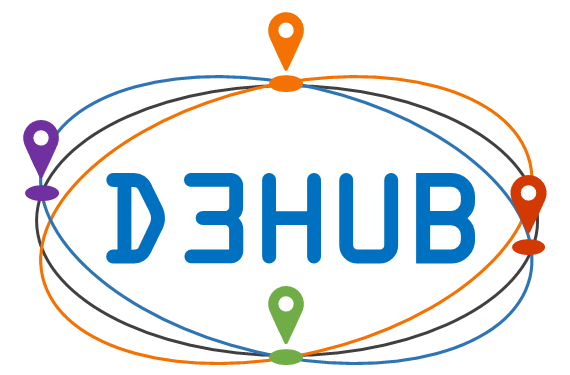Daniel Iglesias Gonsálvez, NECSTouR
On January 15th, the consortium selected 40 destinations to participate in the D3HUB pilot phase. This pilot period, which runs from February 2025 to February 2026, aims to test and refine the services that will be provided by the future European Competence Centre, ensuring their effectiveness and alignment with the needs of European tourism destinations.
In our previous post, we provided data about the final selected participants, highlighting their geographic distribution, governance structures, types of tourism destinations, and proficiency levels in data utilization. As the pilot phase has effectively started, in this new post, we will share information about the methodology used to run it and the first learnings and insights emerging from these initial activities.
D3HUB PILOT METHODOLOGY: FOCUS ON SOLVING REAL CHALLENGES
The pilot phase has been carefully crafted to assess the services that the future European Competence Centre for Tourism will offer by addressing various challenges that European tourism destinations face. These challenges were pinpointed through an extensive consultation process carried out through multiple channels, culminating in the identification of the following topics:
- Redistributing tourism flows in space and time.
- Managing the balance between residents, visitors, and stakeholders.
- Climate change mitigation and adaptation.
- Supporting emerging destinations to attract quality and sustainable tourism.
The initial phase of the pilot involved assigning each participating destination to a specific thematic cluster. Personalised interviews followed to understand each destination’s unique requirements, priorities, and needs related to their cluster topic. This tailored approach has enabled effective customization of content and services to meet these individual needs. Additionally, a new observer role has been introduced in response to requests from participating destinations- many of whom expressed interest in multiple thematic clusters, reinforcing that these challenges rarely occur in isolation but are often interconnected. Through this observer status, destinations can request to participate as listeners in additional clusters beyond their assigned ones. This strategy facilitates a more holistic consideration of each destination’s needs, enriching their experiences and broadening the overall learning outcomes of the pilot phase.
The D3HUB pilot methodology integrates expert guidance, peer exchange, practical application, and cross-cluster collaboration to enhance learning and impact:
- Expert insights and knowledge sharing: presentations from the D3HUB team and external experts, real-world case studies, and discussions on the latest research. Includes open Q&A sessions with expert panels.
- Peer learning and experience exchange: destinations share their challenges, initiatives, and best practices to foster mutual learning within each cluster.
- Hands-on exercises and practical applications: practical tools and frameworks are introduced and applied through real-life scenarios and collaborative problem-solving activities.
- Cross-cluster learning: Two cross-cluster events promote knowledge exchange across diverse thematic areas, providing opportunities to explore other clusters and expand perspectives.

Online presentation of the KOM of the D3HUB pilot phase
EMERGING INSIGHTS FROM THE INITIAL PHASE OF THE PILOT
Although the pilot is still in its early stages, interviews and exchanges with participating destinations are already revealing several key insights:
- Bridging the gap between data and strategy: while many destinations collect valuable data, there is a better opportunity to integrate this information into strategic decision-making and action planning—especially to manage the balance between residents and visitors effectively.
- Building internal data capacity: strengthening in-house expertise in data analysis is essential. Enhanced analytical skills within destination teams can drive more informed decisions and foster a deeper understanding of resident-tourist dynamics.
- Improving tourism governance: there is a pressing need to foster closer collaboration between policymakers and Destination Management Organisations (DMOs) to improve governance frameworks and align efforts more effectively.
- Demand for forecasting and real-time data: destinations call for better forecasting models and real-time monitoring tools to anticipate trends and respond swiftly to changes.
- Addressing seasonality: reducing reliance on peak seasons remains a top priority, with many destinations seeking strategies to attract visitors year-round.
- Navigating sustainability challenges: while interest in sustainability grows, destinations struggle to define clear and actionable sustainability indicators. Measuring environmental sustainability in concrete, operational terms remains a major challenge.
- Engaging the private sector for climate action: collecting and sharing data with the private sector is essential for advancing climate action and building a more resilient tourism ecosystem.
- Strengthening crisis and adaptation strategies: there is a strong demand for improved crisis management tools and destination adaptation strategies, particularly for vulnerable geographies such as mountain regions, islands, and urban areas.
These insights provide only a glimpse of the broader set of issues that have already begun to emerge, even though the pilot phase has just commenced. Other significant themes include the need to reduce seasonality and diversify tourism offerings, the essential role of infrastructure in shaping destination performance, the importance of sustainable transport policies, and the challenges rural destinations especially encounter in attracting and retaining a skilled workforce.
The upcoming months promise to be exciting as we delve into these topics in depth with participating destinations and collaborate to co-create meaningful, practical solutions.
D3HUB PILOT EXPECTED OUTCOMES
Alongside the webinars planned for the pilot phase, a dashboard will be developed to monitor various participant indicators. This dashboard will calculate a range of metrics, focusing on sustainable indicators (environmental, social, and economic). Participants will be invited, guided, and assisted in supplying various data sources to construct this dashboard.
In the upcoming posts, we will continue to share updates on the pilot’s progress and highlight the key learnings and challenges that arise throughout its implementation. Given how promisingly it has started, we are confident that this exciting journey will provide a valuable set of insights—not only for the participating destinations but also for the D3HUB consortium leading the design of the future European Competence Centre for Tourism and for the wider European tourism sector as a whole.
Stay informed with the latest news and insights from the D3HUB pilot by registering as a stakeholder. Join the journey and play an active role in shaping the future European Competence Centre for Tourism.
